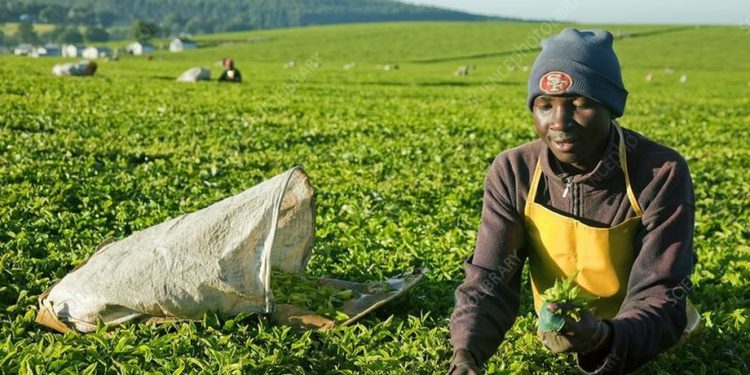The tea industry in Kenya is facing a severe crisis as instability and uncertainty continue to plague the sector. Recent reports indicate that the country is losing approximately $2 million every week at the tea auction in Mombasa due to insecurity in growing zones, leading to the suspension of operations by key producers. This alarming situation has been further exacerbated by Tanzania’s decision to shift its tea market platform from the Mombasa auction to Dar es Salaam. Additionally, the sale of Finlay Kenya’s tea estates to Sri Lankan Browns Investments Plc has raised concerns about the future of the crop.
The sale of Finlay Kenya’s tea estates to Browns Investments Plc has observers worried about the implications for the tea sector. As part of the agreement, Browns and Finlay will sell 15 percent of the shares to a locally owned co-operative. However, the ongoing disruptions in large-scale tea producer farms in Kenya’s South Rift areas have significantly affected business at the Mombasa Tea Auction, and the situation is expected to worsen if the disturbances persist. The board of the East Africa Tea Trade Auction (EATTA), which manages the Mombasa Tea Auction, has expressed concern about the economic ramifications of the invasion of tea estates in the Kenyan highlands, as the supply of teas in the auction is expected to decline.
Read more: Addressing Cane Scarcity In The Kenyan Sugar Industry Through Zoning
The situation took a turn for the worse when Ekaterra Tea Plc, formerly Unilever, announced the suspension of its operations in Bomet and Kericho counties following locals’ invasion and destruction of its property. Ekaterra Tea Plc stated that the recent protests and looting by suspected criminal groups at their tea estates in Kericho and Bomet counties forced them to suspend operations. Due to heightened insecurity, large tea producers operating in Kericho, Bomet, Nyamira, and Nandi counties have also threatened to scale down their operations.
Arthur Sewe, Chairperson of the EATTA board, expressed grave concerns about the potential losses if all tea plantations shut down and operations at the Mombasa Tea Auction are halted. He emphasized that tea plantations account for 40 percent of the volume traded in the auction and warned that the consequences would be catastrophic if they ceased to participate. Sewe called on the Kenyan government to intervene and resolve the problem, pointing out that the invasions were being encouraged by companies that continued to buy tea plucked illegally by the invaders.
Read more: Agriculture As Kenya’s Major GDP Contributor
EATTA has taken steps to address the issue by issuing a circular to its members, instructing them to refrain from purchasing tea from suspected invaders. Failure to comply with this directive may result in de-registration from the association. The Federation of Kenyan Employers (FKE) has also called on the government to address the insecurity, highlighting the significant impact these incidents have on the economy, large-scale tea producers, and their workers. The FKE urged all parties to engage in social dialogue and work towards resolving the dispute that has resulted in the suspension of operations at several tea producer farms.
Interior Cabinet Secretary Kithure Kindiki warned businesspersons and politicians behind the demonstrations, estate invasions, and illegal tea harvesting, stating that they would face charges. Following the torching of nine tea plucking machines and tractors belonging to Ekaterra Tea Plc, which led to the suspension of its operations indefinitely, 11 suspects have been arrested and charged. The fate of 16,000 jobs hangs in the balance due to these criminal activities.
Florence Owino, CEO of EATTA, emphasized that the developments in Bomet and Kericho counties would compel some investors to shift their operations to other countries in the region, affecting both the quantity and quality of Kenyan teas in the market. She warned that if investors shut down in Kenya, they would likely seek to expand their investments in Tanzania, where Ekaterra Tea Plc already has other plantations. Tanzania’s Agriculture Minister Hussein Bashe has confirmed that the government plans to market its tea through the Dar es Salaam Auction starting in June, conducted by the Tanzania Mercantile Exchange using an online system.
The Tea Board of Kenya reported a significant shipment increase to $1.07 billion last year. The average price of tea leaves at the Mombasa tea auction also rose by 18.6 percent to an average of $2.49 per kilogram due to a weak shilling. The depreciation of the Kenyan shilling against the dollar and improved prices contributed to the increase in export earnings. In 2022, exports reached 410.2 million kilograms of made tea, compared to 388 million kilograms in 2021. The Tea Board of Kenya noted that the weaker shilling played a vital role in boosting earnings, with a depreciation of 11.6 percent in the 12 months leading up to December 2022.
The loss of millions of dollars each week at the Mombasa Tea Auction, potential job losses, and the potential shift of investments to other countries in the region clearly indicate the urgent need for intervention in the tea sector. The Kenyan government, industry stakeholders, and law enforcement agencies must collaborate to address the root causes of these disturbances, protect tea estates, and ensure the sustainability of one of the country’s most important agricultural sectors.
Email your news TIPS to editor@thesharpdaily.com














